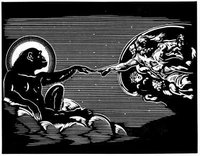 “It’s not natural.”
“It’s not natural.”“The traditional family will be destroyed”
“Children will be harmed.”
These are some of the arguments that were raised during an informal debate on gay marriage that arose during a management course I attended a few weeks ago. It arose from a discussion that focused on managing diversity in the workplace with regards to race, religion and sexual orientation. I took part in the debate by making a few points in support of gay marriage. Most of the group argued against homosexual union, while two of us voiced support for the idea. It was an interesting and thought provoking debate for all of us.
Where does South Africa stand with regards to gay marriage? In December 2005, the South African Constitutional Court (analogous to the Supreme Court in the United States) ruled that South Africa’s Marriage Act was unconstitutional on grounds that it discriminated against homosexuals. Last Thursday, Cabinet voiced its support for this decision. The result of this is that from December this year, homosexuals can legally marry and share all the legal benefits that heterosexual unions enjoy.
I am excited about this decision. I could never understand why Cori and I could easily marry and enjoy legal benefits of such a union, while gay friends of mine - who were in committed relationships with their partners - were barred from those same benefits. During apartheid, mixed racial couples were not allowed to legally marry in South Africa. Fortunately, this changed after the advent of democracy in 1994. The South African constitution, which was drawn up in 1996, prohibits discrimination on grounds of race, gender, religion and sexual orientation. It is only logical that if South Africa repealed laws that discriminated against couples of mixed racial groups, it would also have to repeal laws that discriminate against gay couples. The amendments suggested by the Constitutional Court for the Marriage Act was a positive step in this direction.
Some conservative Christian groups have naturally reacted negatively to these developments. Listening to some the arguments raised during the debate, I can understand their concern. However, South Africans live in a secular society that is characterised by many different cultures, races, religions and beliefs. To enjoy the benefits of secular society (e.g., to have the freedom to worship one’s religion of choice) one has to make various sacrifices (e.g., to be subject to limitations that restrict one’s ability to impose religious beliefs on others). Conservative Christian groups should realise that they cannot force society to live by some of their values, simply because there are many individuals in society who are not Christian.
I look forward to attending and celebrating the marriages that will eventually take place between my gay friends. It is a freedom that should not be taken lightly because it is a freedom that was hard fought for.



